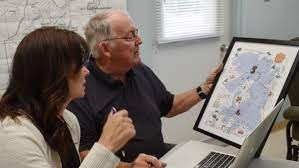Gilbert Peters worked at the paper mill in Kapuskasing for 40 years, retiring at the age of 58. Bored and missing the social life of work, he turned to volunteering. He helped with nature trail maintenance, sat on the Town Council of Moonbeam, 22 kilometres east of Kapuskasing, where he resided at the time, and took a lead role in saving the town’s only grocery store.
The owner of the store had put it up for sale and threatened to close it, so Gilbert brought the community together and led a fundraising campaign that succeeded in collecting $325,000 to purchase the business and turn it into a co-op.
As Gilbert tells us in this video, “We had a business that was going under and we turned it around.”
If the store had closed, it would have been necessary for Moonbeam residents to drive 25 kilometres east or 40 kilometres west to do their grocery shopping. Today, the co-op is a thriving business with plans to expand.
Gilbert didn’t stop there. In 2012, when the Liberal government decided to end overnight camping at 10 provincial parks in Northern Ontario, including the Rene Brunelle Provincial Park near Moonbeam, Gilbert rallied opposition to the move. He commissioned an economic impact study and succeeded in persuading the government to reverse its decision, demonstrating the park’s importance as an economic driver for local businesses.
Always eager to contribute to his community, Gilbert stepped in the save Moonbeam’s ski hill. He led a fundraising campaign to acquire a CT scanner for Kapuskasing’s Sensenbrenner Hospital, raising $1.7 million in 83 days, and went on to establish a hospital foundation.
Gilbert also serves on the board of directors of the North Claybelt Community Futures Development Corporation, a funding agency that small businesses in the area depend on for advice and financial support.
In this video, Gilbert attributes the health of the North Claybelt region’s forest industry to sound management of the Gordon Cosens Forest, and tells us about the growing importance of agriculture, as farmers from elsewhere in Canada are attracted to the inexpensive, fertile land in the area for growing canola, peas and cash crops.
